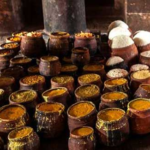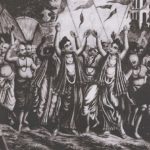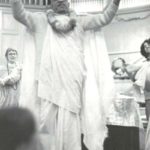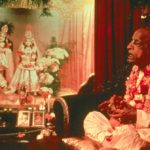Every year I make my personal finances public. Attached is an accounting of my finances for 2023. … [Read more...] about My personal finances, 2023
All articles by Jayadvaita Swami
All the articles by Jayadvaita Swami on jswami.info
Closing words
“Śrīla Prabhupāda’s Kīrtana Standards,” installment 56 I hope this book will help us better please the Personality of Godhead by our kīrtana. And I hope you will forgive me for whatever faults I have dragged into the book. I am not by nature sweet of speech or gentle at heart. But I have tried to be of some service. I beg that the Vaiṣṇavas please excuse whatever offenses I have made in trying to serve them. Hare Kṛṣṇa, Hare Kṛṣṇa, Kṛṣṇa Kṛṣṇa, Hare Hare Hare Rāma, Hare Rāma, Rāma Rāma, Hare Hare … [Read more...] about Closing words
Prasādam
“Śrīla Prabhupāda’s Kīrtana Standards,” installment 55 Śrīla Prabhupāda was particular in making sure that kīrtana was followed by prasādam. In my experience at 26 Second Avenue, after his class and kīrtana he would have a little cut fruit handed out to everyone. I remember an engagement at the Arlington Street Church in Boston where no arrangement had been made for distribution of prasādam. Śrīla Prabhupāda insisted that there be prasādam, and I remember devotees sitting on the stage cutting up fruit before the program ended so that prasādam could be distributed. In the … [Read more...] about Prasādam
Lord Caitanya’s saṅkīrtana party
“Śrīla Prabhupāda’s Kīrtana Standards,” installment 54 The father of the sankīrtana movement, of course, was Śrī Caitanya Mahāprabhu himself. While Śrīla Prabhupāda and the early London devotees were staying at John Lennon’s estate in Tittenhurst, Mukunda Dāsa (later Mukunda Goswami) asked Śrīla Prabhupāda how Lord Caitanya did kīrtana, back in the sixteenth century. What did the chanting parties look like in those days? Mukunda Mahārāja relates: “Yes,” he paused, smiling like he was pleased with my question. He leaned forward as though he was revealing something very … [Read more...] about Lord Caitanya’s saṅkīrtana party
Dancing
“Śrīla Prabhupāda’s Kīrtana Standards,” installment 53 A discussion of dancing in kīrtana could take up a book in itself. Considering the sorts of dancing seen in ISKCON today, such a book would be welcome. Here let us just touch upon the topic.1 Śrīla Prabhupāda wrote: Regarding your question about the dancing, the dancing should be done enthusiastically by raising the hands like Panca-Tattva. You can also dance enthusiastically by raising hands. All of Lord Caitanya's followers used to dance with raised hands. If someone dances with ecstasy, that is all right, but it is better to … [Read more...] about Dancing
Men and women in kīrtana
“Śrīla Prabhupāda’s Kīrtana Standards,” installment 52 Akiñcana Kṛṣṇa Dāsa (who, by the way, is a gṛhastha) has written to me: What about standards for men and women mixing? I have seen, for example, major kirtan festivals, including at ISKCON Mayapur, with beautiful young women singing while handsome young men play mrdanga and other instruments for them. In general, kirtan can be exploited by men trying to show off in front of women, or women dancing and singing attractively for men. Are there any standards to discuss that may mitigate this? Clarifying standards on this strikes … [Read more...] about Men and women in kīrtana
Pronunciation
“Śrīla Prabhupāda’s Kīrtana Standards,” installment 51 We should do our best to learn proper pronunciation for Sanskrit and Bengali words. For Sanskrit we can rely on the pronunciation guide found in all of Śrīla Prabhupāda’s books. And of course we learn by hearing the Sanskrit correctly pronounced.1 For Bengali the transliterations in BBT books show how the Bengali text is spelled, not how it is pronounced, but we can learn by hearing Śrīla Prabhupāda, other Bengali devotees, or others who know how to pronounce Bengali right. Śrīla Prabhupāda once said, “[W]hen we are reading Bengali, … [Read more...] about Pronunciation
Microphones and amplifiers
“Śrīla Prabhupāda’s Kīrtana Standards,” installment 50 Over-loud amplification Microphones and amplifiers can help make voices and instruments heard. But simply turning up the sound system full blast, making the kīrtana as loud as amplified rock music, may not be the best way to go.1 When the settings are at their best, the leader’s voice will not be louder than the sound of the devotees responding. Rather, those present will hear the leader singing with them as if at the same natural level. And the instruments, even if amplified, will never be so loud that they distract attention … [Read more...] about Microphones and amplifiers
Don’t divert attention to more instruments
“Śrīla Prabhupāda’s Kīrtana Standards,” installment 49 During Śrīla Prabhupāda’s early days in the Second Avenue storefront in 1966, the young people who came for kīrtana brought all sorts of instruments. Satsvarūpa Dāsa Goswami writes: Prabhupāda was lenient during kīrtana. Visitors would bring harmoniums, wooden flutes, guitars, and they would follow the melody or create their own improvisations. Someone brought an old string bass and bow, and an inspired guest could always pick up the bow and play along. Some of the boys had found the innards of an upright piano, waiting on the … [Read more...] about Don’t divert attention to more instruments
Sticking to one tune
“Śrīla Prabhupāda’s Kīrtana Standards,” installment 48 There’s much to be said for sticking to one tune throughout a kīrtana, rather than switching from tune to tune. Back when I was a kid there was a television show called “The Original Amateur Hour.” Amateur performers would come on stage to sing, tap dance, do magic tricks, or what have you, each for perhaps two or three minutes. And this sometimes seems what kīrtana has become: two minutes for a tune, or three minutes, because we don’t want the chanters to get bored. We’ve got to keep changing the tune, and changing it again, the … [Read more...] about Sticking to one tune









You must be logged in to post a comment.